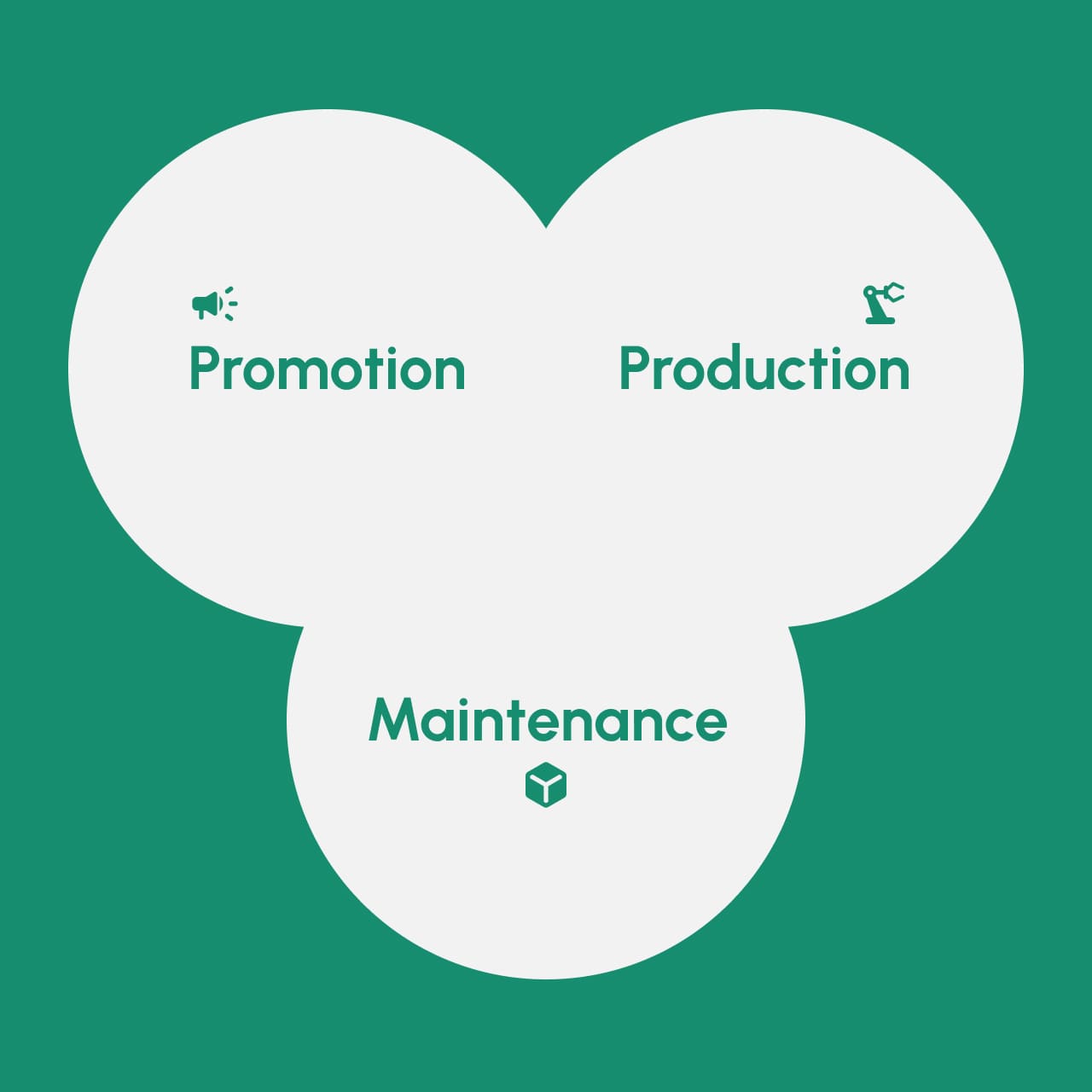Your business operation is divided into three categories
As the decision maker of your company, a clear understanding of the three divisions of your daily activities helps you better allocate your focus and resources
The operation of a company, regardless of the size, can be quite complex with many different tasks and challenges to overcome on a daily basis.
A critical part of managing a company is the effective allocation of its limited resources. The part of your operation with the highest resources will be the most active and subsequently have the most influence on your outcome. The complexity of an operation might make it difficult for the decision-makers to allocate their resources to match their goals and priorities.
For this reason, we have divided the operations and activities of a company into three categories; Production, promotion, and maintenance. These three categories are all deeply integrated into each other and often overlap. The purpose of this categorization is to have a better understanding of the priorities and resource allocation of your business.

Production activities
The production part of your operation is any activities that involve the preparation, design, production, and delivery of your product or service. These activities are often considered the “core” activities of a business. After all, if you don't have any product/service to offer to potential consumers, you don't really have a business.
Of course, depending on what you do, your production activities can vary significantly. The production activities of a manufacturing firm are drastically different from that of a financial consultancy.
The production operation of an apparel company involves market research, design of the products, procurement of materials, preparation, and assembling of the final product, and the necessary packaging and logistics. On the other hand, the production operation of a business consulting firm involves constant research and analysis of the market and business fundamentals of the clients.
In certain businesses and industries, the production operation starts after the sales compared to industries like manufacturing where the production starts well before any sales. Even in industries where the production starts after the sales, a considerable amount of resources such as equipment and talent has to be ready to be deployed. The preparation, maintenance, and upkeep of these resources, even without any actual output is part of your production activities.
Promotion activities
The promotion part of your operation is any activity that involves bringing the attention of the public and potential customers to your company and converting their attention to a sales transaction.
Promotion and sales of your product/service and business are as important as your production. Even though we recognize businesses by what they offer, it is their promotional activities that introduce them to us.
Again, depending on the nature of your operation, your promotional activities may vary significantly. The ultimate goal is to introduce your company and what you sell to the market, create an interest among potential customers, and complete the sales.
Small and local businesses that are not scalable and not actively growing may have no reason to promote their business much. Your local supermarket won't be running advertisements on the Internet as their potential customers are limited to a small geographical area. However, even such small and localized businesses still need some promotional activities. They need to make sure that they have visible and desirable signs and exteriors to attract visitors and need to make sure that they can be found in online registries, maps, and search platforms.
Even companies that may seemingly not NEED any promotion, still do for a variety of reasons. Boeing is one of the two largest companies manufacturing commercial airplanes. The airplanes that Boeing produces start from $90 million and go up to half a billion dollars. Obviously, the general public will not be directly purchasing an airplane but Boeing still needs to create a positive image of their products and company in the eye of the public. You probably will never purchase anything directly from Boeing but Boeing wants you to feel better and safer if you fly with a 737 rather than an Airbus A320. This feeling of safety, in a large enough population, affects the purchasing decisions of airlines, who are the ultimate customers of Boeing. Not to mention that these advertisements are also meant to attract talent and leave a positive impression on the legislation.
For the rest of us mere mortals, active promotion is vital to the success of our business.
Too much promotion
At different stages, you might shift your focus entirely to production or promotion. For example, a newly founded company that is still in the process of finalizing the design, production, and distribution of its product, might need to allocate all of its resources entirely to the production activities as they don't yet have a product to promote. On the other hand, a company that does not need much production for what it sells might need to focus its entire resources on promotion. For example, a company offering cleaning services might need to focus entirely on promotion to acquire new clients as they have already prepared all the tools and staff needed for their services.
However, in most cases, you would need to undertake the production and promotion activities simultaneously. Most companies need to continuously work on the production of their product/service while promoting the current and future state of their business. Here, a delicate balance is necessary to have a high-quality product/service that is known and seen by potential consumers.
If you allocate too much of your resources to the promotion, you end up with a product or service that has a high reach and visibility in the market but disappoints the consumers once they use it.
We all know some companies that created a viral marketing campaign and got everyone excited about their product only to disappoint them later. Since their main focus was on the promotion of their product/service, their failures are the most visible.
The best example of an operation that focused too much on promotion compared to production is the Fyre Festival.

Fyre Festival was a music festival planned to take place in the Caribbean and without a doubt, had one of the most effective and impressive promotion campaigns that anyone can think of. The festival quickly became popular and sold out quickly, even though it was the first time the organizers had produced a music festival.
In their promotion, they managed to persuade some of the most popular social media accounts to post the festival's orange branding at the same time. Not only did the promotion strategy gather the attention of their target demographic, but it also made it to the headlines.
However, the production aspect of the festival was nothing short of a disaster. It was obvious that most of the planning, ideas, and resources were focused on the promotion, and as the promotion became the primary focus, the operation started to promote something it could not deliver.
Another great example is Nikola. Nikola was a startup developing nitrogen-powered trucks with ambitious plans. Nikola made a wave of news and managed to raise over $700 million in funding.
However, similar to the Fyre Festival, despite their successful promotion, they failed to actually develop the product they promised in their promotion. At one point, to demonstrate to the public that they had a working prototype, they towed a truck up a hill and rolled it down the slope, pretending it was being driven. Again, the focus on promotion was greater than it should have been and it started to make promises it could not deliver.
In both cases, even though the promotion activities were successful, the production activities were failures. Of course, we cannot say that they should have moved their resources away from their promotion to avoid their failures but we can say, without a doubt that they needed much more resources on their production.
Too much production
On the other end of the scale, you can focus too much on production without allocating enough resources to promote the product/service you are offering to the market. This imbalance is quite common for engineers and for minor products of large corporations.
The products or services that have failed because they didn't have enough promotion are not uncommon. However, their failures, due to the lack of publicity in the first place, usually go unnoticed.
The running example that I always bring up is the smartphone division of Sony. Sony has been in the business of manufacturing mobile phones since 2001 and at its peak, had a 9 percent market share in a joint venture with Ericsson.

Sony still has a smartphone division and develops and releases new smartphones every year. Yet, most people are completely unaware of the fact that Sony still makes smartphones despite the fact that Sony is a globally recognized company.
The problem here is the opposite of the Fyre Festival. Sony actually makes decent smartphones but virtually nobody knows about them. For context, releasing a new smartphone is a multi-million dollar venture, requiring months of design, development, coordination, and years of post-release support. The process of releasing a new product is extremely resource-intensive and expensive for any company of any size. However, Sony does a terrible job of promoting their products. The average potential consumer has no idea that Sony even produces a smartphone.
A product has to be extremely essential or desirable with little to no viable competition to be actively chased by potential consumers. If a company, for example, is the sole electricity provider of an area, it can be sure that every household and business in the area will actively pursue their product because the product they sell is essential and they have no other competition. But Sony is not the only company manufacturing smartphones. A potential customer has, at any given time, many other smartphones to choose from.
When the business focuses entirely on production with little to no promotional effort, it ends up with a product that may have a decent quality but does not sell. The lack of promotion does not bring the potential legal problems of overpromising about your product but in the end, the business venture will lose money, making it difficult to justify the ongoing costs of further improvements and production. Sony may be able to afford to have a smartphone division that loses money but if a company fails to promote their main product/service, they may end up going bankrupt.
The balance
The success of any product or service requires a balance between the production effort and its promotion.
Whatever the product or service is, it requires enough resources and focus to have a comparable or better quality than the competition. Without a well-developed product that can satisfy the consumers, no company can thrive.
On the other hand, even a product with the highest quality will fail without proper promotion and exposure. After all, people need to know about what you sell and why it is better than your competition.
A successful product or service is the one that has the best quality and most people know about it. Based on your priorities, you need to create a balance between the promotion and production aspects of your operation.
Maintenance activities
The production and the sales of the product and services are exciting. They bring the revenue into a company and the entire public reputation of any firm depends on what they make and how well they sell it.
However, every company needs to take care of a series of routine tasks required for a functioning operation and comply with legal requirements. The most common of these tasks are accounting, record keeping, document management, HR, payroll, and similar tasks.
The maintenance activities are the glues that connect the pieces of production and promotion together. This is part of your operation that tells you if you're making a profit, if you're not breaking any laws if your employees are being paid and are not facing any issues in their workplace, and if your customers are happy with what they buy from you.
These tasks do not make you any money. If they do make money for you, you're probably breaking one or two laws. This part of your operation, if done right, will go unnoticed. However, if done wrong, they will cause a lot of trouble.
Most first-time founders start their businesses without any solid idea about what the maintenance activities are and what they entail. In most businesses, the maintenance activities are usually the first and sometimes the only part of the operation that is outsourced.
However unlikable these tasks might be, it is crucial for the top management to have a good understanding, oversight, and control over the maintenance activities of the company. Not only these activities are necessary for the smooth operation of the company, but many of them are legally required to be thorough and accurate. Even if you have outsourced these tasks, you, as the director of the company, will remain legally liable.
You cannot cut corners when it comes to the maintenance part of your operation. Depending on the nature and volume of your work, a minimum amount of maintenance is required and if you commit any less, you will either compromise the accuracy and effectiveness of your operation or expose yourself to legal or financial liabilities.
At times, the time and resources spent on maintenance might seem like a waste. At times it might seem like the resources might better be allocated toward production or promotion, but the complex structure and requirements of our modern businesses require a minimum quantity of resources for maintenance that cannot be overlooked.
